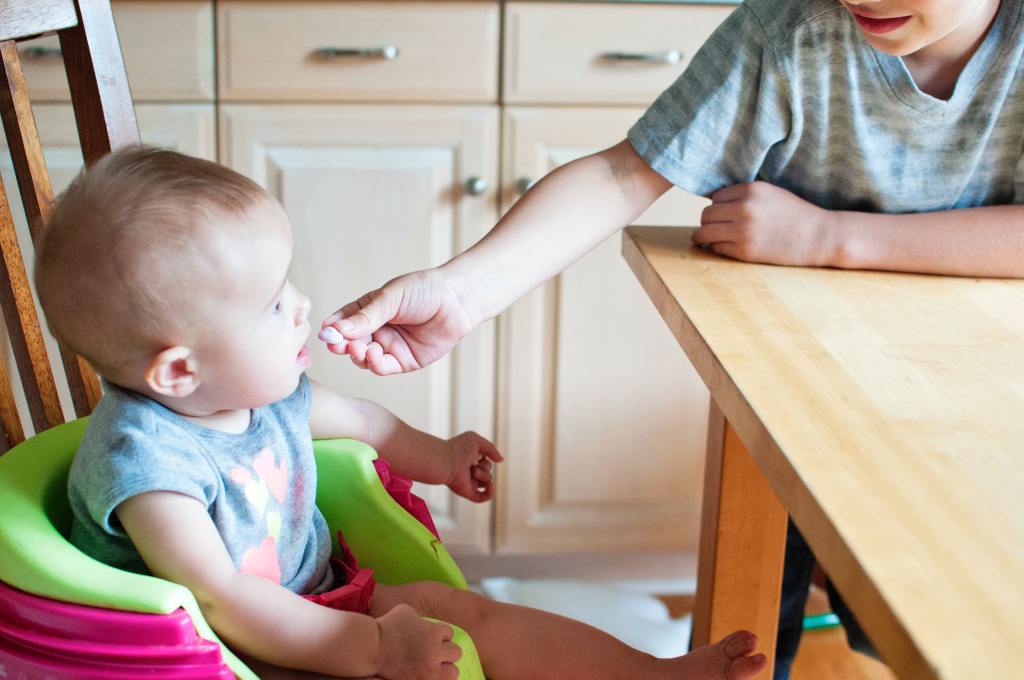As your baby inches toward the end of his or her first year, there will come a time when you can start on solid foods, usually at 4 to 6 months. However, several parents want to know, “When can my baby have peanut butter?” And who can blame a parent for wanting their baby to enjoy peanut butter, which is proven to be one of the favorite snack staples for many generations?
Plus, some parents might feel concerned about a possible peanut allergy and want to see how their child would respond. Are you one of the ones asking, “Can I give my baby peanut butter?” Well, we have the answer to that question and more advice about introducing your baby to peanut butter or peanut butter powder.

When can my baby have peanut butter?
Dr. Amanda Cox, MD, FAAAAI states that between 4 to 6 months is a good time to introduce peanut butter. However, she also recommends having an allergy evaluation or testing before incorporating any foods that contain peanuts.
One of the key factors to watch for before introducing peanut butter is the onset of eczema or an allergic reaction to eggs. According to a report by Amitha Kalaichandran, Tom Marrs, and George du Toit, these two traits, especially the risk of developing a skin rash, indicates a possibility of a peanut allergy. In other words, for babies with a history of mild eczema or an egg allergy, you can introduce peanut butter into their diet from around 6 months only after introducing other solids. However, having a history of eczema, egg allergy, or both can indicate a higher chance of also being allergic to peanuts. Likewise, if your baby has no history of eczema or egg allergy, you can incorporate peanut butter into their meals between 4 to 6 months under careful watch.
For a more severe case, you can ask an allergist to run a test, or your pediatrician may send in your baby’s bloodwork to look for the antibodies that signal a peanut allergy.
Benefits of introducing peanut butter early on
Peanut butter contains nutritional benefits that are valuable to babies. It’s rich in protein, vitamins B6 and minerals. While these perks and the minimal preparation make it a favorite afternoon snack, you might feel torn between the health benefits and an allergic reaction. To give some reassurance, a study that was published in the New England Journal of Medicine shows that babies who steadily have peanut butter included in their diet have a lower risk of an allergy. So, unless, you’ve already observed an allergic reaction to other foods, as previously mentioned, you can cautiously start introducing peanut butter or peanut butter powder.

How to introduce peanut butter to your baby
When you are ready to give your baby peanut butter, you can start by mixing two teaspoons of peanut butter with warm water. Also, you might keep in mind that peanut butter should never be given by itself.
You can also incorporate other hacks to introduce peanut butter that prevents your child from choking on the new food. Here are some tips to follow:
- Mixing a small amount of peanut butter with yogurt or your baby’s favorite fruit or veggie puree
- Using peanut powder to create a sauce by mixing it with warm water, applesauce, banana, or prepared oatmeal
- Offering some snacks, like Bamba Peanut Snacks, to your baby at 7 months and older.
During the process of introducing peanut butter, Dr. Aikaterini Anagnostou, the director of the Food Immunotherapy Program of Texas Children’s Hospital, recommends paying attention to possible choking hazards. If you notice that your baby has a hard time swallowing a peanut butter mixture, then you might need to thicken the substance just a bit.
Final thoughts
So, as you’re wondering whether to give your baby peanut butter, you’ll need to keep in mind the precautions relating to allergies and choking. And speaking of the need to avoid difficulties with swallowing, remember that straight peanut butter is not an option. Your baby doesn’t have the oral skills yet to deal with food that stays on the roof of the mouth or is too thick to swallow. Age-appropriate snacks can also be a great way to introduce peanut butter, but regardless of which route you choose, your baby will soon enjoy the nutty flavor of this classic snack food.



